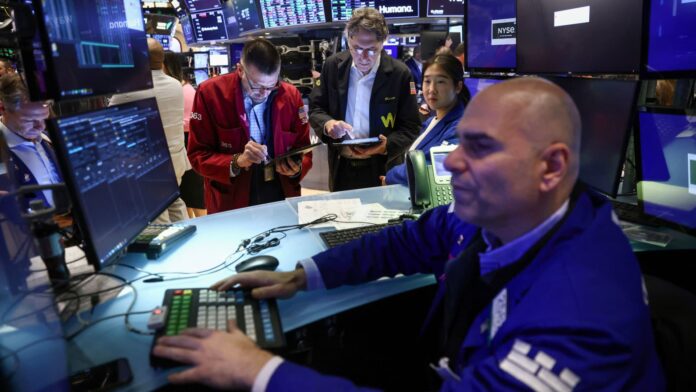Earnings for the fourth quarter haven’t been as dire as some investors feared, but they are likely to continue to deteriorate. With 143 companies of the S & P 500 reporting, Refinitiv early Friday said the beat rate for earnings per share was 67.8%, slightly above the average 66% pace. Revenues have been beaten forecasts 65% of the time so far, compared to a 62% long-term average. But when it came to the size of the beat, companies this quarter appear to be lagging. Earnings in aggregate topped estimates by just 1.6%, well below the 4.1% since 1994 and the 5.3% average of the last four quarters, according to I/B/E/S data from Refinitiv. Earnings for all S & P 500 companies fell 2.9% for the fourth quarter, based on actual reports and estimates. When energy is excluded, earnings are down 7.1%. Revenues, on the same blended basis, are up 4.2% but they are larger than expectations by just 0.6% in aggregate, less than half the long term average, according to Refinitiv. “If we’re moving forward and you’re already down 7% non-energy earnings in an up 3% quarter for GDP, that doesn’t necessarily bode well going forward,” said Brian Rauscher, Fundstrat head of global portfolio strategy and asset allocation. Stock strategists have been expecting an ‘earnings recession,’ meaning more than one quarter of negative growth. Some strategists expect that to coincide with an actual recession in the economy, which could make the earnings picture even weaker. That also means stocks could face a bumpy ride as expectations continue to slide. “My takeaway from the guidance has been the sequential weakening of forward guidance, which began when you got first quarter reports in April,” said Rauscher. “Every quarter the guidance has been weaker and weaker. Yes, there’s an occasional higher quality company that’s saying things are better than the rest, but the trend is getting worse.” Rauscher expects a shallow recession, and his view is S & P 500 earnings for 2023 will be about $210, below the street’s consensus closer to $230. “I have earnings down between 5% and 10%,” he said. If the recession is deeper than he expects, the decline could be even sharper. According to Refinitiv, analysts expect a 1.2% decline in first quarter earnings, followed by a 2% drop in the second quarter. The third quarter is then expected to be up by 4% and the fourth quarter 10.1% higher. Some analysts say those forecasts are still too high. “I think the earnings are going to struggle. I don’t think the earnings are friendly for the market. I don’t think these earnings are priced in,” Rauscher said. With Apple, Amazon and Alphabet all reporting this coming Thursday, investors are hoping big tech growth names will help the sentiment around earnings. Meta Platforms also reports on Wednesday. So far, tech’s earnings look to be down 8.7% for the quarter, based on the blended rate, according to I/B/E/S data from Refinitiv. Communications services earnings, which includes Alphabet, are down 21% based on estimates and actual reports, according to Refinitiv. Tech earnings have been a mixed bag. Microsoft beat on earnings, missed revenues and its guidance was weaker. IBM beat on revenues, and earnings were in line with forecasts. Intel reported a big miss in its earnings late Thursday, and its stock was pummeled Friday. INTC 1Y line intel “The earnings for big tech are really important because there’s still a huge part of the S & P that’s in growth and tech,” said Keith Lerner, co-chief investment officer at Truist Advisory Services. “For this market to make headway, you need those stocks to participate.” Outside of tech, other sectors are also seeing declines in earnings. Consumer discretionary earnings look to be down 15.6% and materials are down by 20.6%, according to Refinitiv. But energy is up 59.6% and the industrial sector’s profits on a blended basis are up 39.3%. Lerner said the market appears to be getting ahead of itself with the S & P 500’s forward 12-month price-to-earnings ratio back up to 18. He remains defensive on the market even with the 6.5% gain in the S & P 500 in January so far. “You still have valuation headwinds,” he said. Jan Szilagyi, Toggle AI CEO, said he is watching the tech sector carefully, and if the big tech names can weather negative earnings that would be a positive for the market. “They may not lead the market to the upside, but at least they’re not going to be dragging them to the downside anymore,” he said. Those companies have been cleaning up balance sheets and reducing excess labor. “All the layoffs, all the news seems to be around the tech sector. That isn’t all of the economy, but it’s hogging the limelight,” he said. “Those [earnings] announcements are going to be very telling.” Szilagyi said so far during earnings, the reaction in the stock market is more muted than normal. When stocks miss, the declines have averaged about 1.6% on the day on average, versus a typical 3% decline, he said Thursday. “You still get directionally the right response, but I think it’s possible after almost 13 months of being in a bear market, investors may have reached a level of exhaustion,” he said. Toggle is an artificial intelligence-driven research platform used by retail and professional investors. It can be used to predict price movements in stocks and other assets. Szilagyi said the market continues to be in an interest rate driven cycle, led by Federal Reserve policy. “If you were in a more normal non macro environment, you would assume you’d get a bigger reaction to earnings,” he said.
© heardonwallstreet.com


